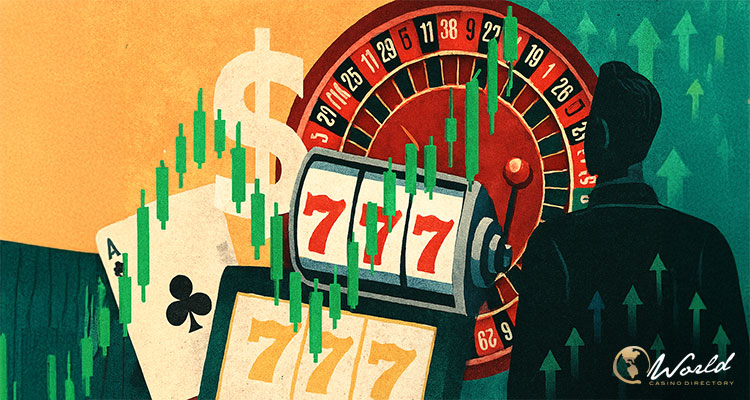As U.S. iGaming expansion continues to stall, sweepstakes casinos are filling the void—emerging as one of the fastest-growing and most debated segments of the online gambling industry. The June update from Waterhouse VC highlights how this legally murky model is attracting both players and investors, with revenues soaring and competition intensifying.
Sweepstakes Outpacing Regulated iGaming
Waterhouse VC, a venture capital firm focused on global gaming investments, reports that the sweepstakes casino sector generated $3.1 billion in gross gaming revenue (GGR) in 2022. That figure is projected to jump to $11 billion by 2025—well ahead of revenues from state-regulated iGaming platforms.
With only seven U.S. states currently allowing regulated online casinos, the sweepstakes model has emerged as a popular alternative. In states where legislation has stalled due to political resistance, moral concerns, or pushback from existing land-based operators, sweepstakes casinos provide a workaround that has proven effective in attracting users.
What’s Fueling the Sweepstakes Boom
Several structural advantages are propelling this growth. Unlike regulated casinos that require strict identity verification and geolocation checks, sweepstakes platforms typically allow users to start playing with just an email and phone number.
They also benefit from fewer marketing restrictions. Sweepstakes operators can freely advertise on platforms like Google, Meta, and TikTok—channels that are often off-limits for regulated gambling brands due to compliance constraints.
Another advantage: these companies don’t pay licensing fees or state gaming taxes. That cost efficiency enables aggressive spending on product innovation, user engagement, and customer acquisition. Although these platforms may see lower conversion rates to paid play, those who do spend are often highly engaged and loyal.
Market Fragmentation and Rising Competition
According to Waterhouse VC, the sector is becoming increasingly competitive. VGW, the operator behind major sweepstakes brands like Chumba Casino and LuckyLand Slots, once dominated with over 90% market share. That dominance has slipped to about 50%, as more than 25 new operators are expected to enter the market in 2025 alone.
This influx of competition signals a land rush, as companies attempt to build brand loyalty before regulators potentially tighten rules. While this presents huge opportunities, it also raises the likelihood of increased regulatory scrutiny.
Industry Leaders Double Down on Sweepstakes
Gaming Innovation Group (GiG) has made its intentions clear. The company is targeting the U.S. sweepstakes market through its new platform, SweepX, which was launched in May. GiG described the opportunity as one that has “substantially increased the platform’s addressable market.”
SweepX features include a dual-wallet system, prize store management, and AI-powered gamification to increase user interaction. Primero Games will be the first client to launch on the platform in the second half of the year.
GiG projects that sweepstakes casinos offer “a lifetime player value of up to $1,000 over two years,” with typical transaction sizes ranging from $20 to $50. Its newly spun-out platform business, GiG Software, is set to begin trading on the Nasdaq First North market on October 1. GiG expects €44 million in platform revenue for 2025, with 82% already contracted and EBITDA margins around 23%.
Playstudios Nears Full U.S. Launch
Playstudios is also betting big on sweepstakes casinos. The company, known for games like myVegas Slots, announced that it is nearing a national rollout of its sweepstakes platform. CEO Andrew Pascal noted during a recent earnings call that after nine months in development, the platform is already in open beta across seven states.
“Player retention, engagement and monetization are all trending in the right direction,” Pascal said. He emphasized that this new sweepstakes model is changing consumer behavior and creating pressure on traditional social casinos.
“This trend is pressuring traditional offerings, including our core social casino portfolio. That said, these dynamics were anticipated, and they’re exactly why we launched our reinvention program last year,” Pascal added.
While sweepstakes casinos offer growth, they’re also facing scrutiny. A new survey by the American Gaming Association found that 90% of respondents view sweepstakes casinos as a form of gambling, with most players using them in hopes of winning money. Some lawmakers question the legality of these platforms, and several states have issued cease-and-desist orders.
Playstudios is proceeding cautiously. “We’re taking a measured and rigorous approach to scaling focused on ensuring that when we open the product to all eligible states, the experience is fully optimized and delivers on our high standards, player expectations, and return on ad spend thresholds,” said Pascal.
Final Outlook: Growth Meets Uncertainty
The U.S. sweepstakes casino boom is reshaping the online gambling market, offering rapid growth where regulatory gaps exist. For now, operators enjoy high margins and freedom to advertise, and investors are seeing returns.
But the future hinges on regulation. Waterhouse VC notes that “the sustainability of sweepstakes industry growth may ultimately depend on how regulators choose to classify and control these operations.”
As more players and money flow into this space, oversight is inevitable. Until then, the sweepstakes model remains a compelling—and controversial—gambling frontier.



